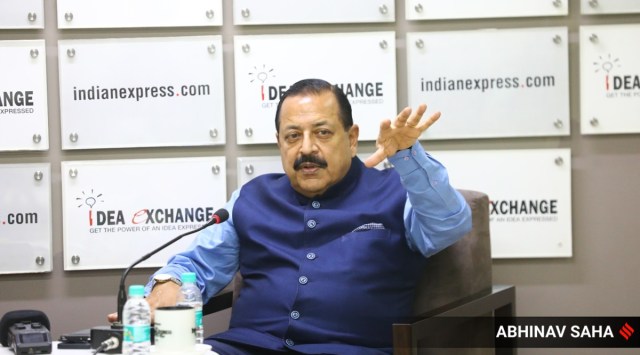On the lines of civilian awards, Government of India will now recognise scientists with Rashtriya Vigyan Puruskar under four categories — Vigyan Ratna, Vigyan Shri, Vigyan Yuva–Shanti Swarup Bhatnagar, and Vigyan Team — said Union Minister for Science and Technology Dr Jitendra Singh during Indian Express Idea Exchange Monday.
This comes days after the government released the finalised list of Shanti Swarup Bhatnagar awardees that was held back for a year. The highest honour for young scientists retains the name Shanti Swarup Bhatnagar.

Vigyan Ratna will recognise the lifetime achievement of scientists, Vigyan Shri will recognise distinguished contributions to a field, Vigyan Yuva Shanti Swarup Bhatnagar will encourage young scientists who have made exceptional contributions in their field, and Vigyan Team will recognise teams of three or more. The awards will commence in 2024.
Story continues below this ad
The Rashtriya Vigyan Puraskar will be awarded in 13 domains – Physics, Chemistry, Biological Sciences, Mathematics and Computer Science, Earth Science, Medicine, Engineering Sciences, Agricultural Science, Environmental Science, Technology and Innovation, Atomic Energy, Space Science and Technology. “It may be ensured that each domain/field is represented. Adequate representation of women may also be ensured,” a government document said.
There will only be three Vigyan Ratnas awarded yearly: 25 Vigyan Shri, 25 Vigyan Yuva, and 3 Vigyan Team. Only Vigyan Yuva will have an age limit of 45 years.
Nominations for the awards will be accepted every year between January 14 and February 28, which is recognised as National Science Day. The awards will be announced on National Technology Day, May 11. On the other hand, the award ceremony will be held every year on the recently announced National Space Day, August 23, to mark the day India’s Chandrayaan-3 landed on the Moon.
All internal awards, except for one named after Homi Jehangir Bhabha given by the Department of Atomic Energy, “have been dispensed,” according to information with The Indian Express. The internal award will be given to 30 recipients in the form of certificates.
Story continues below this ad
A committee under the chairmanship of the principal scientific adviser will select the awardees. The Rashtriya Vigyan Puraskar Committee will be constituted of all secretaries of all six science departments, four presidents selected from science and engineering academies, and six distinguished scientists and technologists from different fields of science.
This committee will be constituted annually, with the committee members ineligible for the award during their tenure. The awards processes will be carried out by the Council for Scientific and Industrial Research (CSIR) for the first two years and will be taken over by the newly instituted National Research Foundation.
This is in line with the government’s effort to “rationalise” awards in science and technology. Dr Singh said: “We have not discontinued awards, we have rationalised them. We have reduced the numbers to add to the sanctity and value of the awards. After all, a coveted award has to be coveted.”
“We have done away with endowments. What was happening was that when a scientist passed away, their family would finance an award in their name. That would not carry as much weight,” he added.
Story continues below this ad
The Department of Science and Technology used to give 207 awards, of which four were of national importance. They also had 97 private endowments and 56 internal awards. The Department of Biotechnology gave six fellowships as awards. The Department of Atomic Energy gave 25 performance-based honours and 13 non-core domain awards.
The Indian Space Research Organisation (ISRO) had three internal awards. The Council of Scientific and Industrial Research (CSIR) gave seven awards, including the coveted Shanti Swarup Bhatnagar award. The Union Ministry of Earth Sciences gave four national awards.









